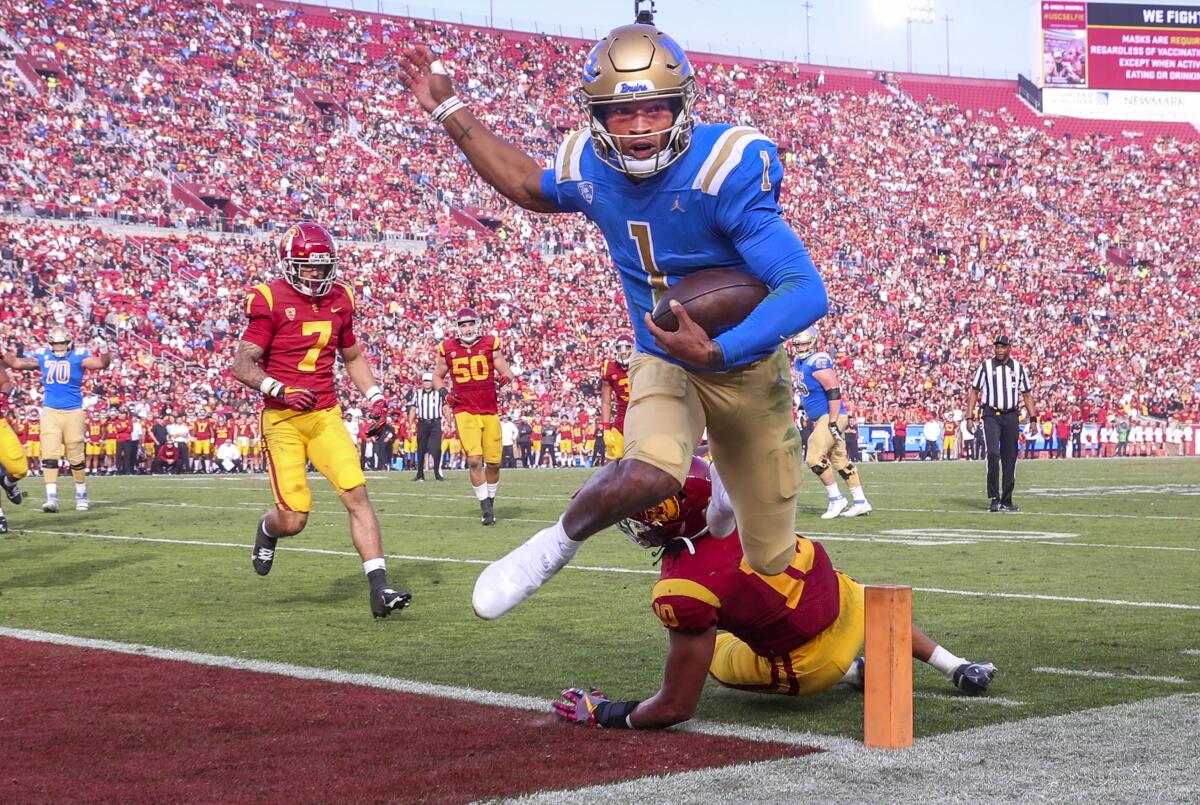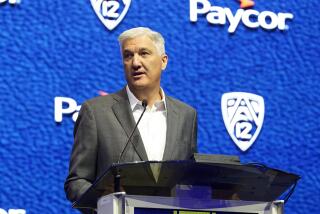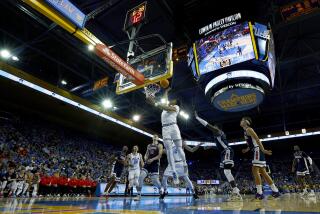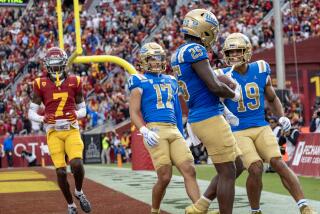Newsom demands that UCLA publicly explain deal to leave the Pac-12

California Gov. Gavin Newsom on Wednesday demanded that UCLA explain how its Pac-12 exit for the Big Ten will benefit all of its student-athletes and honor its relationship with UC Berkeley — the only UC campus that will be left behind and will likely take a big financial hit in a conference weakened by big-name defections.
“The first duty of every public university is to the people — especially students,” Newsom said in a statement. “UCLA must clearly explain to the public how this deal will improve the experience for all its student-athletes, will honor its century-old partnership with UC Berkeley, and will preserve the histories, rivalries, and traditions that enrich our communities.”
Newsom made an unusual appearance Wednesday at the San Francisco meeting of the UC Board of Regents, where he serves as an ex-officio member, to join the board’s closed-door discussion on the issue.
The decision by UCLA — along with USC — to leave the Pac-12 Conference in August 2024 has left Cal and other remaining conference teams reeling over the threat of losing millions in media rights revenue, not to mention the holdovers’ viability as a major player in the rapidly shifting college sports landscape.
UCLA and UC Berkeley have declined comment on the issue.
Last month, when UCLA announced its migration to the Big Ten, university Chancellor Gene Block and athletic director Martin Jarmond touted the move’s ability to secure the financial future of an athletic department facing an unprecedented $102.8-million deficit.
The expected windfall from a new Big Ten media rights deal — which is expected to yield in excess of $1 billion — could more than double the yearly payout the Bruins would have received by remaining in the Pac-12, while sparing the school from a doomsday scenario — the elimination of some Olympic sports teams — it potentially faced by standing pat with diminished resources.
As part of the Big Ten, UCLA expects to benefit from increased media exposure while playing in the nation’s only conference spanning coast to coast, boosting recruiting efforts and enhancing the ability of its athletes to secure lucrative name, image and likeness deals.
UCLA and USC are also joining a conference that’s emerged as a worthy foil to the supercharged Southeastern Conference. The Big Ten has placed one team in the College Football Playoff in six of eight years since the series’ debut in 2014. The Pac-12 had lagged far behind, sending only two teams to the playoffs and none since Washington in 2016.
The Bruins and Trojans are also expected to please their fans with the earlier football kickoff times necessitated by joining a conference with counterparts in the Central and Eastern time zones. That will eliminate late starts that kept local viewers up until nearly midnight and limited exposure in other parts of the country where viewers had already gone to bed.
As governor, Newsom has no authority to squelch the deal because the UC system is constitutionally autonomous. As a regent, he could ask his board colleagues to consider directives to UCLA about the deal — to explain it in a public meeting, for instance, or to propose ways to mitigate the financial fallout on UC Berkeley. The UC Office of the President delegated authority in 1991 to campus chancellors to execute their own contracts, including intercollegiate athletic agreements.
Newsom understands the benefits to UCLA and its right to pursue the deal but is troubled by its actions as a public university with an obligation to be transparent and accountable, according to Ben Chida, the governor’s principal advisor on education.
“It’s about more than sports and more than money,” Chida said, describing Newsom’s views. “It’s about public trust. It’s about student-athlete mental health. And it’s about honoring the partnerships, histories and traditions that have lasted a century.”
UC President Michael V. Drake knew about UCLA’s conversations with Big Ten officials. But regents were not consulted then and only a “handful” were notified just before the decision was announced and told to keep it confidential, said Board of Regents Chair Richard Leib. UCLA made the decision “under broad-based delegated authority which didn’t necessarily anticipate this type of action,” Leib said.
While any discussions would necessarily need to be closely guarded, given the sensitivity of negotiations, Newsom would like to have seen a process that included a meeting with regents, potentially in closed session, where UCLA could have outlined the proposed deal, explained the direct benefit to student-athletes, and solicited ideas on how to mitigate the harm to UC Berkeley and other conference members, Chida said.
Ideas raised have included requiring UCLA to pay UC Berkeley a Pac-12 “exit fee” or share the TV revenue with its sister campus — conditions that the regents could potentially impose.
UC Berkeley is bracing for a multimillion-dollar hit once UCLA and USC leave the Pac-12 conference in two years, which will probably result in a huge loss in media revenue under a new TV contract.
The campus has been struggling with a structural deficit for years. Berkeley first announced a $150-million shortfall in 2016, which it successfully closed, only to face a larger hole of $340 million last year due to crippling losses in revenue from student housing, food and other sources along with increased costs during the pandemic. The campus has balanced its budget this year after pausing investments in lab renovation, deferred maintenance and other needs.
Chida noted that Newsom has significantly boosted funding for UC, recently fought to provide $500 million to UCLA for a new immunology center and said he was perturbed to see the Westwood campus behave like a “private media corporation” in its Pac-12 dealings.
Student Regent Marlenee Blas Pedral, a UC Berkeley law student, said the board wanted more transparency and communication from UCLA. She said she found out about the Pac-12 exit in the media.
“This one decision impacts all the 10 UC campuses; their decisions don’t only impact their student athletes,” she said. “I think at the end of the day it impacts other sports, other athletes, other campuses not just now but 10 years, five years out.
“I think UCLA should definitely do something to help mitigate some of the potential harm that’s going to come out of this,” she said, adding that she was not yet “100% sure” what that should be.
More to Read
Start your day right
Sign up for Essential California for news, features and recommendations from the L.A. Times and beyond in your inbox six days a week.
You may occasionally receive promotional content from the Los Angeles Times.








